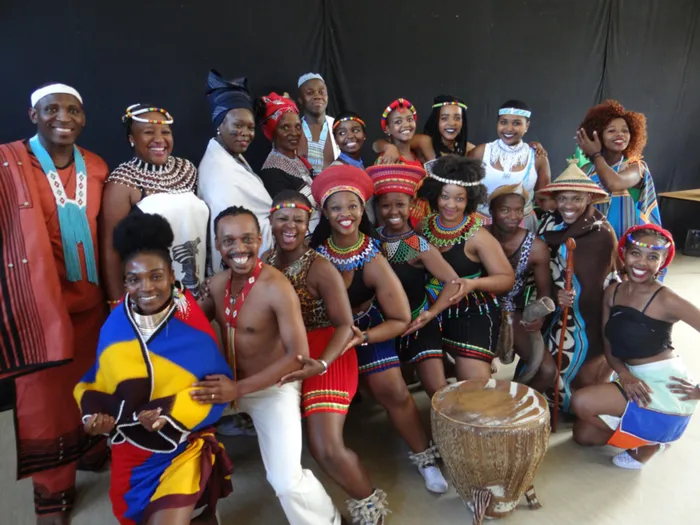
Karen Rutter
LONG before world music became a genre, before Paul Simon met Ray Phiri, and before Ladysmith Black Mambazo started winning Grammys, Miriam Makeba introduced international audiences to South African music.
The singer and civil rights activist, who began her career in the 1950s with The Manhattan Brothers and later The Skylarks, became one of the country’s best-known musical exports – and was ironically sentenced to 30 years in exile from her motherland by the apartheid government.
Makeba died in 2008, but her legacy lives on in the form of recordings and filmed concerts, and undoubtedly in the generations of singers she has inspired in South Africa. Now a new musical which celebrates her life will be premiered in Cape Town this month. Miriam Makeba – Mama Africa!
The musical is a joint venture between the University of Missouri, St Louis, in the United States, and the University of the Western Cape (UWC). It has been researched, written and directed by Niyi Coker, Distinguished Professor of Theatre and Media Studies at the University of Missouri. The process took him three years, he says, and has been very much about learning and growing.
“We were looking to do a collaborative production between the two universities, and it made so much sense to focus on Makeba. She was South African – but she also spent many years in exile in the US, and performed with Americans such as Harry Belafonte and Dizzy Gillespie. She is known in both countries – her story has affected not just South Africans, but the African diaspora,” explains Coker, in a break during rehearsals at UWC.
“We had a lot of support from the ZM Makeba Trust and the Carnegie Africa Diaspora Fellowship Programme,” he says. “I had to make a lot of trips back and forth between South Africa and the States, and I’m very, very happy with the cast and the production we have,” he says.
Playwright, screenplay writer and director Coker has directed over 50 major stage productions around the world.
He has also served as Director for several professional theatre companies ranging from the National Theatre of Nigeria, to Malmo Hogskola in Sweden, and several productions in Bermuda. For the Makeba musical, he auditioned over 300 people over the course of four weeks to find the final 30 actors, dancers and singers.
“We held auditions at Artscape, in Khayelitsha, in Langa and Gugulethu. There is so much talent here in the Western Cape! The final cast is made up of students as well as community performers – the aim is to provide training as we rehearse,” he explains.
While Coker researched the production from an academic angle, he says that it has been in rehearsals over the past few weeks that a more personal angle has emerged. “A lot of the cast knew Makeba’s songs, but now they also know the reason behind some of them, why they were written. I’ve also learnt a lot – they’ll read the script and tell me “Xhosa people don’t speak or react like this”, and we’ll adapt accordingly. It’s been a great process,” he says.
The production will feature more than 30 songs from Makeba’s repertoire, including both originals and “covers” that she loved. “Makeba even sang in French, especially when she lived in Guinea for 15 years,” says Coker.
One of the most important aspects was to amalgamate Makeba’s life story within the socio-political context that drove so much of her creative career. Coker has chosen to start the work on the eve of Makeba’s return to South Africa in 1990, after three decades away, and after the release of Nelson Mandela (who personally persuaded her to come home).
“We see her reflecting on her life, and everything that has happened up to this point. Did she ever think she would be in this space, about to catch a plane back to South Africa? How did she get here in the first place?” explains Coker.
To this end, the cast includes “two Miriams”, as Coker puts it. “We have the older woman, in her 60s, reflecting on the past, and then a younger woman in her 20/30s, representing that past. At some point they even sing duets,” he says.
The show opens this month in Cape Town, and will return for a season at The Baxter in 2017. In between it will play in New York and St Louis.
Henriette Weber, Director for the Centre for Performing Arts at UWC, who was involved in the auditioning process, says it is a unique opportunity for them to be part of the collaboration with the University of Missouri.
“This is our first project together to develop a more vibrant arts and theatre programme for UWC, as a historically underprivileged institution where stage productions were banned for much of the apartheid era,” she says.
For Coker, the production marks his first working project in South Africa, and he describes it as a “wonderful experience, really remarkable.”
l Miriam Makeba - Mama Africa! The Musical will be at at Cape Peninsula University of Technology’s Bellville campus on May 27 and 28. Book: 0861 915 8000